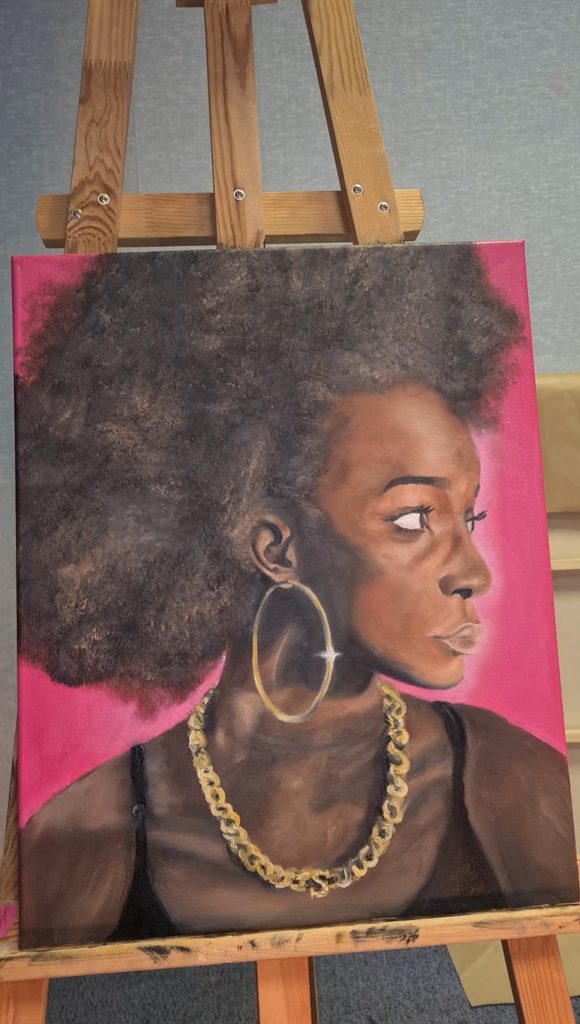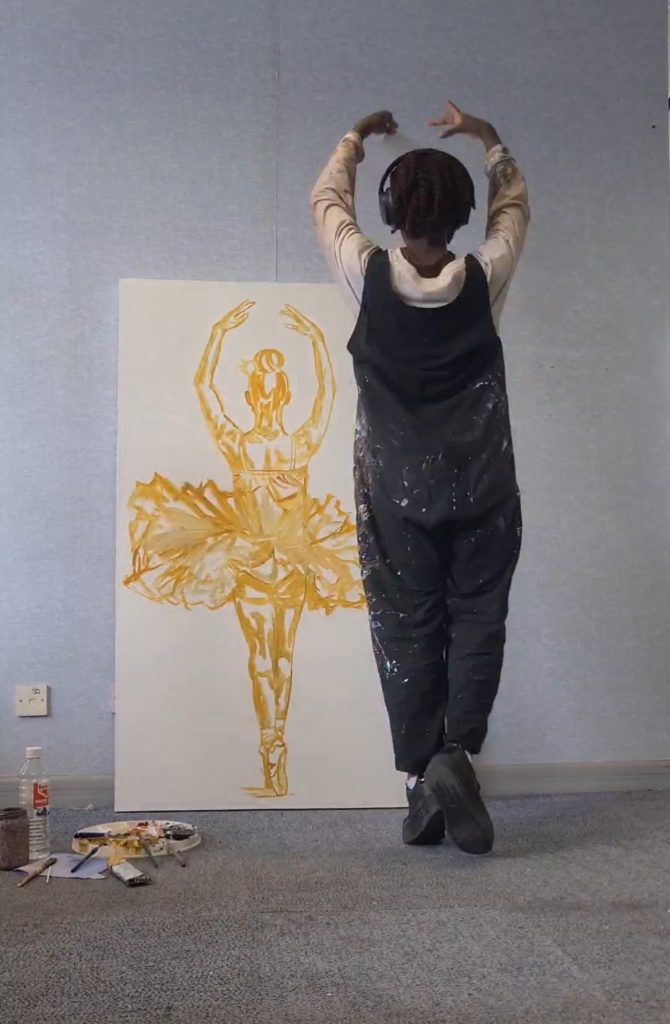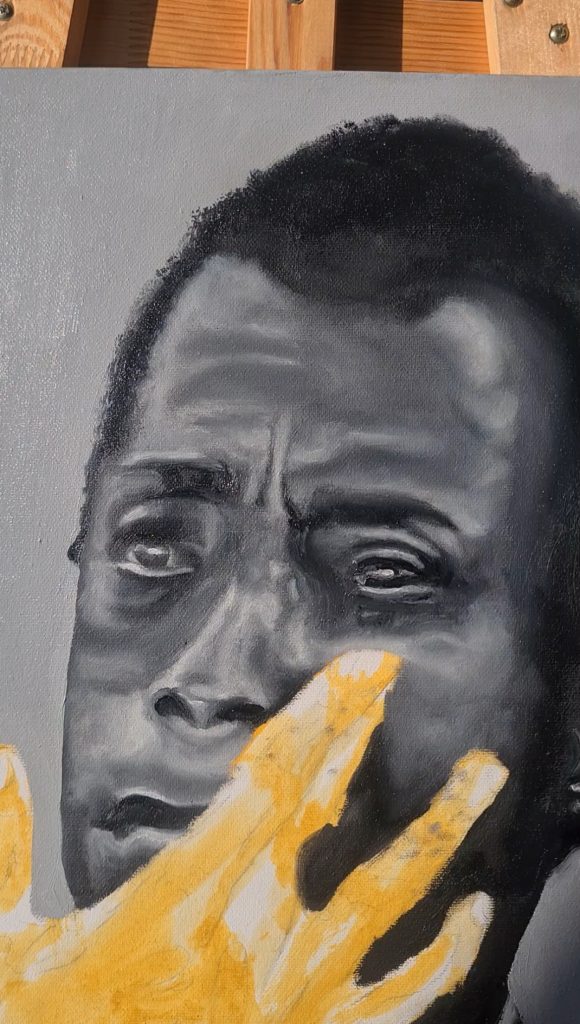We spoke with Shannon Ward, a former member of the Art&Design Club at the University of Wolverhampton (2017 – 2018). Having recently won the Freelands Painting Prize, she has now graduated with a first in Fine Art. In this conversation, Shannon reflects on her artistic practice, the significance of amplifying black voices through her work and her experience at the National Saturday Club.
Please can you tell us what National Saturday Club you joined and what sparked your interest in joining this Club?
I joined the University of Wolverhampton Art&Design Saturday Club between 2017-18.
My art teacher in secondary school mentioned it to me and a few other students. She thought I might be interested, so I decided to give it a try, especially since they offered to cover the travel costs. From the very first day, I knew I was in it for the long haul. Initially, I thought it would just be about drawing and painting but I ended up getting so much more out of it.
At the time, I wasn’t sure which direction I wanted to take with my art. I had just started getting into pencil portraiture but I wasn’t fully set on anything. So, I thought, why not give it a go and see where it leads?
Did you have any special stand-out memories from your time at the Club?
I remember always being the first one to arrive and the last to leave. The Club tutors even commented on my dedication and that stuck with me. I still remember their faces and it’s special because I ended up studying at the University of Wolverhampton. It really pushed and inspired me to go to university.
I also kept a little diary about what we did each time I went. We explored different types of printing, ceramics, painting and so much more. It really broadened my perspective. At first, I thought art was just black-and-white, about drawing and painting but it exposed me to so many other avenues, it was a real eye-opener.
What are you up to now?
After the Club, I completed my GCSEs and went to college, where I studied Fine Art, English Literature, and English Language which I’ve been told is a good combination. When lockdown started in 2020, I bought loads of paints and canvases and was making art every day for months. I even started selling on Etsy, with my friends supporting me. It was great to have a bit of a business mindset.
After that, I went to the University of Wolverhampton and graduated with a First in Fine Art. I’ve had many opportunities since. Earlier this year in March, I was invited, through my art Instagram page, by artist Whitney Ellis to exhibit for International Women’s Day in Brixton. I exhibited a triptych self-portrait series exploring the theme of Black female empowerment.
Congratulations on winning the Freelands Painting Prize 2024. Tell us about that experience and what you created.
My university tutors nominated me for the Freelands Painting Prize 2024, and I submitted about three or four recent paintings. The Freelands Foundation then chose which one to exhibit. They selected my piece, Black Beauty (2023). It’s a huge 6 feet painting which took me several months to complete, but I never forced myself to paint if I wasn’t feeling it.
The painting was inspired by a photoshoot I had with my friends where I wore a red dress. There was a picture of me getting up from a stool, and I loved it, so I created a large painting based on that image.
I didn’t expect to win; I just felt privileged to be nominated. Being one of only a few students nominated from universities across the UK was already an honor. There were 56 nominees, and that got narrowed down to 12 winners who exhibited. I was just happy to be nominated.
The exhibition itself was amazing! It was so special to see people looking at my work and then realising I was the artist. They’d see me standing near it and say, “Oh, is that you? Did you do that?” It was a really meaningful experience.
What would you say your art practice is based around? What is your main purpose in your art?
My work is based around black representation because there’s been so many gorgeous paintings, like gorgeous paintings out there which I’ve seen in art galleries. I’m seeing these great paintings, but I don’t see anything that I relate to, and it would be nice to have a painting that I look at and think there’s a black person or a person of colour or someone that could be me or something that connects me to it.
Black art doesn’t have to be about oppression or slavery – that’s not the entirety of our history. We have an incredible history before and beyond that. I want my work to reflect that positive light. Our stories need to be told in a better light and that starts with artists creating work that represents that vision.
That’s why I create portraits of people of color, often self-portraits, but also of family and friends. I want people to look at my work and see themselves, to feel connected rather than isolated from the art world.
What improvements would you like to see within the creative industry when it comes to art and under-represented voices?
There needs to be more publicity and recognition for black artists, especially those we might not hear about otherwise. I only learned about many black artists through college and university, where my teachers pointed them out to me.
For example, the Black Arts Movement started at the University of Wolverhampton. In my second year, some fellow students of colour and I were inspired by that movement and created our own group, Wolves Togetherness. I’m one of the founding members and we’re still active. We’ve had a few exhibitions, and our second one was in April last year. Some of the original members from the Black Arts Movement even attended.
We also held a panel discussion and invited a few other artists.
Our next exhibition is coming up soon, from October 11th to November 2nd, here in Wolverhampton as part of Black History Month.
How has the National Saturday Club helped influence what you are currently doing?
I still think about it a lot. If I hadn’t joined the Club, I’m not sure I’d have pursued art in the same way. Another passion of mine is English – I absolutely loved it. I could have gone down a different path, maybe even become an English teacher. It’s amazing how things unfold, and I owe a lot to the Saturday Club. I still remember some of the tutors and even see them around the university. I’m still in touch with many of them.



Shannon Ward’s Artwork
Interview conducted and edited by Suprina Thapa